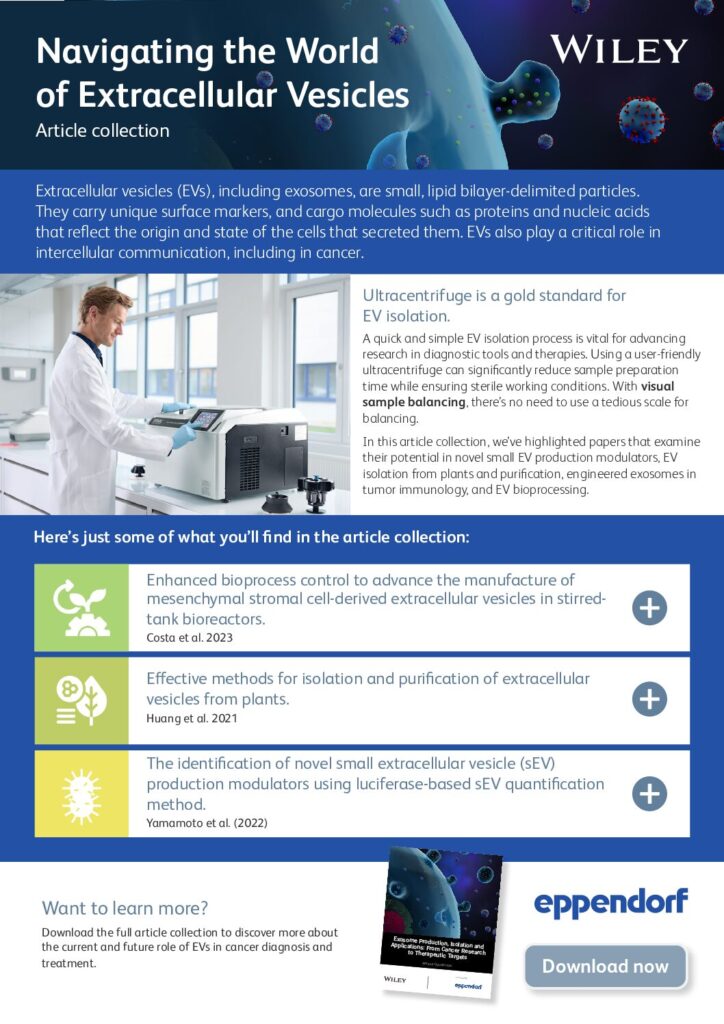Download this complementary Infographic and Article Collection today!
Discover the groundbreaking role of extracellular vesicles (EVs) and exosomes in cancer research through our latest complimentary infographic and article collection. These small, lipid-encased particles carry unique surface markers, and cargo molecules such as proteins and nucleic acids that reflect the origin and state of the cells that secreted them. They are not only essential for cell-to-cell communication but also hold immense promise in cancer diagnosis and treatment.
Our infographic spotlights some of the key studies of the article collection on innovative modulators for small EV production, plant-derived EV isolation, engineered exosome applications in tumor immunology, and advancements in EV bioprocessing.
What You Will Learn:
- The pivotal role of EVs in cell communication and cancer research.
- Plant-based EV isolation methods for sustainable therapeutics.
- Engineered exosomes’ impact on tumor immunology and targeted therapies.
- EV bioprocessing advancements enhancing cancer diagnostics and treatments.

Click on the image below to download the free Article Collection eBook.
Through our article collection, you will get a thorough overview of innovative methods for isolating, identifying, and purifying exosomes. The collection emphasizes the critical role of production and isolation techniques in developing new diagnostic tools and therapies for diverse diseases. Our goal is to showcase these benefits to enable researchers to fully explore their potential.
What you will learn:
- Exosome isolation techniques
- Advances in biomarkers for cancer diagnosis/prognosis
- Engineered exosomes for immunotherapy
- Production of exosomes using bioprocess equipment and purification from plants
Articles contained in the Article Collection:
Tang, Z., Li, D., Hou, S., & Zhu, X. (2020). The cancer exosomes: Clinical implications, applications and challenges. Int J Cancer
Alptekin, A., Parvin, M., Chowdhury, H. I., Rashid, M. H., & Arbab, A. S. (2022). Engineered exosomes for studies in tumor immunology. Immunol Rev
Yamamoto, A., Takahashi, Y., Inuki, S., Nakagawa, S., Nakao, K., Ohno, H., Doi, M., & Takakura, Y. (2022). The identification of novel small extracellular vesicle (sEV) production modulators using luciferase-based sEV quantification method. J Ex Bio
Wang, X., Qian, T., Bao, S., Zhao, H., Chen, H., Xing, Z., Li, Y., Zhang, M., Meng, X., Wang, C., Wang, J., Gao, H., Liu, J., Zhou, M., & Wang, X. (2021). Circulating exosomal miR-363-5p inhibits lymph node metastasis by downregulating PDGFB and serves as a potential noninvasive biomarker for breast cancer. Mol Oncol.
Costa, M. H. G., Costa, M. S., Painho, B., Sousa, C. D., Carrondo, I., Oltra, E., Pelacho, B., Prosper, F., Isidro, I., Alves, P., & Serra, M. (2023). Enhanced bioprocess control to advance the manufacture of mesenchymal stromal cell-derived extracellular vesicles in stirred-tank bioreactors. Biotechnol Bioeng.
Huang, Y., Wang, S., Cai, Q., & Jin, H. (2021). Effective methods for isolation and purification of extracellular vesicles from plants. J. Integr. Plant Biol.
Ditte, Z., Silbern, I., Ditte, P., Urlaub, H., & Eichele, G. (2022). Extracellular vesicles derived from the choroid plexus trigger the differentiation of neural stem cells. J. Extracell. Vesicles.



